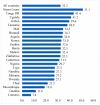Experience of Intimate Partner Violence among Women in Sexual Unions: Is Supportive Attitude of Women towards Intimate Partner Violence a Correlate?
- PMID: 34064797
- PMCID: PMC8151125
- DOI: 10.3390/healthcare9050563
Experience of Intimate Partner Violence among Women in Sexual Unions: Is Supportive Attitude of Women towards Intimate Partner Violence a Correlate?
Abstract
Intimate partner violence (IPV) is predominant in sub-Saharan Africa (SSA), with nearly 40 percent of women reporting IPV at some point in time. In this study, we investigated whether a supportive attitude towards IPV is associated with past-year experience of IPV among women in sexual unions in SSA. This study involved a cross-sectional analysis of data from the Demographic and Health Survey (DHS) of 23 countries in SSA. Bivariate and multivariable binary logistic regression analyses were performed to determine the association between attitude towards IPV and past-year experience of IPV. The regression results were presented in a tabular form using crude odds ratio (cOR) and adjusted odds ratio (aOR) at 95% confidence intervals (CIs). In the pooled countries, we found that women who had supportive attitude towards IPV were more likely to experience IPV compared to those who rejected IPV (cOR = 1.72, 95% CI = 1.64, 1.79), and this persisted after controlling for maternal age, marital status, wealth, maternal education level, place of residence, and mass-media exposure (aOR = 1.72, 95% CI = 1.64, 1.79). The same trend and direction of association between attitude towards IPV and experience of IPV was also found in all the 23 studied countries. This study has demonstrated that women who accept IPV are more likely to experience IPV. Hence, we recommend that efforts to end IPV must focus primarily on changing the attitudes of women. This goal can be achieved by augmenting women's empowerment, education, and employment interventions, as well as sensitizing women in relation to the deleterious ramifications of accepting IPV. Furthermore, reducing IPV is critical towards the achievement of Sustainable Development Goal 3.
Keywords: attitudes; intimate partner violence; public health; sub-Saharan Africa; women.
Conflict of interest statement
The authors declare that they have no competing interests.
Figures
Similar articles
-
Intimate partner violence against married and cohabiting women in sub-Saharan Africa: does sexual autonomy matter?Reprod Health. 2022 Mar 28;19(1):79. doi: 10.1186/s12978-022-01382-1. Reprod Health. 2022. PMID: 35346246 Free PMC article.
-
Exposure to interparental violence and justification of intimate partner violence among women in sexual unions in sub-Saharan Africa.Arch Public Health. 2021 Sep 9;79(1):162. doi: 10.1186/s13690-021-00684-3. Arch Public Health. 2021. PMID: 34503582 Free PMC article.
-
Silent suffering: unveiling factors associated with women's inability to seek help for intimate partner violence in sub-Saharan Africa (SSA).Reprod Health. 2023 Jul 26;20(1):110. doi: 10.1186/s12978-023-01651-7. Reprod Health. 2023. PMID: 37496013 Free PMC article.
-
Socio-Economic Factors Influencing Intimate Partner Violence Among Adolescents and Young Women in Sub-Saharan Africa: A Scoping Review.Public Health Rev. 2025 Jan 3;45:1607041. doi: 10.3389/phrs.2024.1607041. eCollection 2024. Public Health Rev. 2025. PMID: 39829605 Free PMC article. Review.
-
The elephant in the room: Intimate partner violence, women, and traumatic brain injury in sub-Saharan Africa.Front Neurol. 2022 Sep 6;13:917967. doi: 10.3389/fneur.2022.917967. eCollection 2022. Front Neurol. 2022. PMID: 36147046 Free PMC article. Review.
Cited by
-
Exposure to interparental violence and intimate partner violence among women in Papua New Guinea.BMC Womens Health. 2023 Feb 7;23(1):48. doi: 10.1186/s12905-023-02179-5. BMC Womens Health. 2023. PMID: 36750895 Free PMC article.
-
Public Attention and Sentiment toward Intimate Partner Violence Based on Weibo in China: A Text Mining Approach.Healthcare (Basel). 2022 Jan 20;10(2):198. doi: 10.3390/healthcare10020198. Healthcare (Basel). 2022. PMID: 35206813 Free PMC article.
-
Exposure to interparental violence and justification of intimate partner violence among women in Papua New Guinea.BMC Womens Health. 2023 Mar 23;23(1):122. doi: 10.1186/s12905-023-02248-9. BMC Womens Health. 2023. PMID: 36959590 Free PMC article.
-
Inter-generational differentials in perceptions of intimate partner violence in Nigeria.PLoS One. 2025 Jul 15;20(7):e0327214. doi: 10.1371/journal.pone.0327214. eCollection 2025. PLoS One. 2025. PMID: 40663580 Free PMC article.
-
Age at First Sexual Intercourse and Multiple Sexual Partnership Among Adolescent Girls and Young Women in Sub-Saharan Africa: A Cross-Sectional Study.Health Sci Rep. 2025 May 19;8(5):e70798. doi: 10.1002/hsr2.70798. eCollection 2025 May. Health Sci Rep. 2025. PMID: 40391257 Free PMC article.
References
-
- Ahinkorah B.O. Intimate partner violence against adolescent girls and young women and its association with miscarriages, stillbirths and induced abortions in sub-Saharan Africa: Evidence from demographic and health surveys. SSM Popul. Health. 2021;13:100730. doi: 10.1016/j.ssmph.2021.100730. - DOI - PMC - PubMed
-
- World Health Organization . Understanding and Addressing Violence Against Women: Intimate Partner Violence. World Health Organization; Geneva, Switzerland: 2012. (No. WHO/RHR/12.36)
-
- WHO Violence Against Women. [(accessed on 23 April 2021)];2021 Available online: https://www.who.int/news-room/fact-sheets/detail/violence-against-women.
Grants and funding
LinkOut - more resources
Full Text Sources
Research Materials
Miscellaneous



